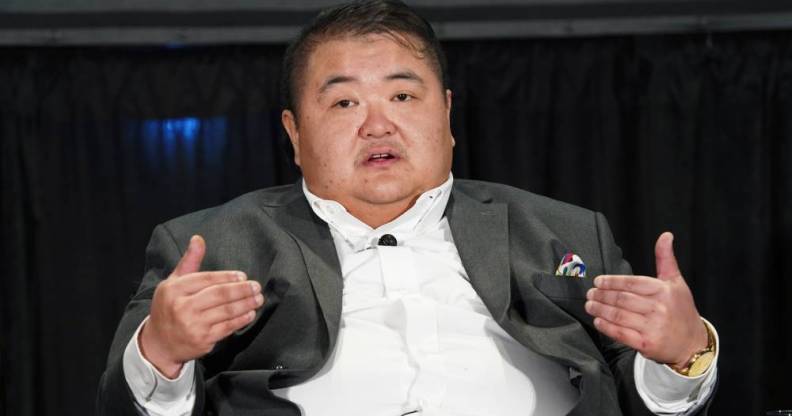World’s ‘most influential’ trans activist Emmett Schelling issues urgent rallying cry

Trans activist Emmett Schelling says trans rights as well as “fundamental ideals around freedom” are under attack in the US. (Amy E Price/Getty for SXSW)
Emmett Schelling, an influential trans activist in Texas, explains how combating anti-LGBTQ+ hate is just part of the fight for full equity for all Americans.
Schelling has been at the forefront of Texas’ fight against anti-LGBTQ+ hate and legislative attacks, so much so that he was named one of Time’s 100 most influential people in the world in May.
Having served as executive director of the Transgender Education Network of Texas (TENT) since 2017, Schelling is “leading a scary and gruelling fight for trans survival”, Chase Strangio, the ACLU’s deputy director for transgender justice, wrote in Time.
The magazine said he has “spent day and night fighting back and building love and safety for his community”.
But Schelling tells PinkNews that any singular recognition doesn’t “paint a full or clear picture of the journey that it took”.

Emmett Schelling, executive director of the Transgender Education Network of Texas, says the final “destination” of the group’s work is reaching a place where everyone recognised every person’s dignity. (Amy E Price/Getty for SXSW)
He’s adamant that he wouldn’t have been able to “achieve any of the things that people are crediting me for” without the “phenomenal” TENT team.
The non-profit organisation works to uplift the voices of trans, non-binary and gender diverse Texans while also striving to end discrimination against these communities through “social, legislative, and corporate education”.
“It’s a reminder for me at this moment to reflect on the journey, reflect on the people who weren’t all named as opposed to this very weird focus on me,”Schelling says.
“I joke that I would like to have a job where I could never be seen or have to do a whole lot of public things and still achieve the things that we’re looking to come together collectively and work towards.”
View this post on Instagram
The recognition comes as governor Greg Abbott continues to push state officials to investigate families of trans youth for “child abuse”. The order, announced in February, has been at the centre of a blistering legal battle that made it all the way to the state’s Supreme Court.
Texas attorney general Ken Paxton has virulently shown his opposition to the LGBTQ+ community. He fought fiercely against same-sex marriage, called gender-affirming medical care “child abuse” in a non-binding legal opinion, misgendered US assistant secretary of health Dr Rachel Levine on Twitter and rallied against a school’s Pride celebrations.
At the same time, Texas has been a legal pioneer in restricting abortion rights in the US. In October 2021 the state banned abortion after six weeks of gestation – before most people know they’re pregnant.
The state has also become the hotbed of the debate on gun control after a gunman opened fire in a school in Uvalde, killing 19 children and two teachers. Abbott and his Republican colleagues have faced harsh criticism for their response to the massacre and the state’s gun laws.

Governor Greg Abbott has faced harsh criticism for his response to the deadly shooting at Robb Elementary in Uvalde, Texas. (Yasin Ozturk/Anadolu Agency via Getty)
All of these injustice are why Emmett Schelling doesn’t want people to put a spotlight on him, but to focus on making change.
“Every alarm needs to be sounded about what this means not just for Texas, not just for trans kids and their families, not just for trans and non-binary adults, young people who live here but what this means as we decide if we believe in these fundamental ideas around freedom,” Schelling says.
“I certainly think freedom entails being able to make your own decisions around your health.
“Where we’re at is really understanding what kind of liberty we do have if we don’t have liberty over our own medical decisions.”
TENT’s mission is to achieve “fully-lived equality” for trans, non-binary and gender diverse folks.
“So let’s make sure this is the reality, and the reality is one that honours just someone’s dignity of being a person,” he adds.
Being named in the Time 100 is a call to action for Schelling more than anything else.
“This now deepens my responsibility of stewardship, or being intentional,” he says.
“I can recognise that while I’m not like going through the crisis reality that I have already, unfortunately, had to experience, I know so many of us in our community are actively.
“At the same time, understanding that needs to be plugged into a very open-eyed, strategic, thoughtful and intentional plan. What does this look like? How do we get to the place we need to get to because the place we need to get to is not to just pass non-discrimination laws, see proactive legislation and see a decrease or decimation of anti-LGBTQ and anti-trans attacks?
“Our destination is to get us to a place where – as a culture, as a country, as a state – we have a full, deep recognition that every single person who lives in the state and calls it home deserves dignity.
“Every single person in the state deserves to be safely and securely employed and not have who they love or just simply who we all are a factor that puts that security in peril.”

